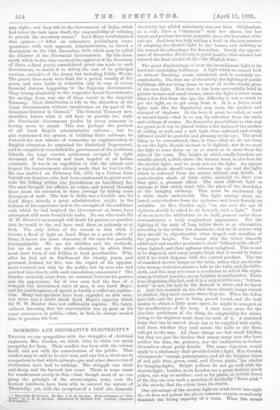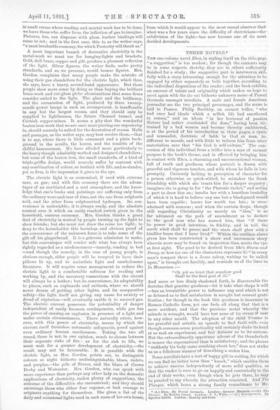DOMESTIC AND DECORATIVE ELECTRICITY.*
THOUGH we can sympathise with the struggles of electrical engineers, Mrs. Gordon, we think, tries to claim too much sympathy for them. Their conflict has been with the science itself, and not with the conservatism of the public. That conflict may be said to be over now, and was but a short one in comparison to that which railways, gas, and other discoveries of civilisation have had to undergo. The struggle was short and sharp, and the harvest has come. There is some cause for wonderment surely in this,—that though most of us can grasp the principle of the steam-engine, none, even the 'keenest intellects, have been able to unravel the nature of Electricity; yet, with the exception of a brief stir, domestic
D000rativo Biaairicity. By Mrs. L B. IL Gordon. With a Ohaptor on "Firo
Thairs." by 3 B. H. Gordon. Illuatratad by Horbort Foil. London: 13ampeon -Low and Co.
electricity has glided noiselessly into our lives. Civilisation, as a rule, likes a " character " with her slaves, but her latest, and perhaps her most powerful slave, she has taken with- out one. And here is a. lady writing a book on the best manner of adapting the electric light to our homes, and utilising to the utmost its advantages for decoration. Surely the appear- ance of Decorative Electricity is proof positive that science has entered the final citadel of all,—the English home.
The great disadvantage of even the incandescent light is its hard and unyielding brilliancy. A light which we cannot look at without flinching, seems unnatural, and is certainly un- comfortable. The first use of electricity, the lighting of public buildings, did not bring home to most of us the steady glare of the new light. Now that it has been successfully tried in private houses and small rooms, where the light is never more than a few feet from the eye, the difficulty is not so much to get the light, as to get away from it. It is a fierce, cruel light, and, like the Equatorial sun, casts the hardest and sharpest of shadows. At the best, it must be veiled, or used at second-hand,—that is to say, by reflection from the walls and ceilings of rooms. Its decorative possibilities in this way are great, as it can be placed within a few inches of the surface of ceiling or wall, and a soft light thus reflected and evenly diffused would be grateful and pleasing to the eye. The great thing to be remembered, then, is this,—that we do not want to see the light, though we want to be lighted; nor do we want the light to come down on us so much as to come from the sides of the room. The height at which candle-brackets are usually placed, a little above the human head, is also best for the electric light; and we must not see the light. An opaque or tinted shade should come between tbe eye and the light, which is reflected from the mirror without any dazzle. A semi-circular shade of thick white material we have seen that gave a pleasant effect. The most difficult light to manage is that which must take the place of the chandelier or the hanging oil-lamp. This must be moderated by a white shade underneath. The light coming down un- toned, casts shadows from the eyebrows and beats fiercely on wrinkles. As Mrs. Gordon says, " no one over the age of eighteen should be asked to sit beneath such a light." Such of us as have the misfortune to be bald, present under these circumstances a truly resplendent appearance. For the lighting of the ends of long tables there is no alternative, according to the writer, but standards ; and we do not see why they should be objectionable when draped and standing at the proper height. The reason why the writer discards additional and smaller pendants is their " billiard-table effect" when lighted, and their ugliness when unlighted. This is not to be disputed, and many people think that it would be better still if we could dispense with the central pendant. The use of standard electrie lamps on the table, unless they are to con- tain storage batteries, means a hole in the table and the table- cloth, and this may yet muse a revolution to which the explo- sions in Central America are as bubbles to earthquakes. There is no disguising this fact, and it is a very terrible one; " button- holed " or not, the hole in the damask is there, and we know it. And this reminds us, too, that these electric lamps cannot be shifted ; they must remain where they are. When the ladies have left, and the port is being passed round, and the host desires to obtain a little more space, he might be annoyed at the steadfastness of the lamp. A man cares more for the absolute usefulness of the thing, its adaptability for minis- tering to his slightest want, than the look of it. A standard lamp that can be moved about has to be supplied with cords, and, these, whether they trail across the table or the floor, will get in the way. All these things are but small hitches, but they are just the hitches that annoy many men who have neither the time, the patience, nor the inclination to bother themselves about petty details. The same objection would apply to a stationary chair provided with a light. Mrs. Gordon recommends "orange, pomegranate, and all the brighter tones of red, pale blue, green, coral, and Sevres pinks," for shades for hanging-lights. Bright yellows do not go well with the electric light ; besides, we in London see a great deal too much yellow, one way or another ; and as for pinks, at certain hours of the day one sees such a quantity of decidedly "fierce pink" in the streets, that the colour loses its charm.
One advantage of the electric light we must never lose sight of,—it does not poison the air, or consume oxygen, or seriously diminish the living capacity of a room. What this means
in small rooms where reading and mental work has to be done, we leave those who suffer from the infliction of gas to imagine. Pictures, too, can dispense with glass, leather bindings will cease to rot; and in the first case, this is, as the writer says, "a most invaluable economy, for which Posterity will thank us."
A most important branch of decorative electricity is the metalwork we must use for hanging-lights and brackets. Gold, dull brass, copper and gilt, produce a pleasant reflection of the light. Silver figures, the writer finds, make pretty standards, and so, we presume, would bronze figures. Mrs. Gordon complains that many people make the mistake of using their gas chandeliers for the electric light, which thus, she says, have a heavy, second-hand appearance. But these people show more sense by doing so than buying the brilliant brass-work and cut-glass globe abominations that some firms consider suited to the light. The glare and the brilliancy, and the coruscation of light, produced by three twenty candle power lamps in such an arrangement, is insufferable in any but the largest rooms, and they should only be supplied to lighthouses, the future Channel tunnel, and Cornish copper-mines. It seems a pity that the wonderful beaten iron-work that we are once more proving our superiority in, should scarcely be suited for the decoration of rooms. Halls and passages, as the -writer says, may best receive them,—that
is to say, where there is little ornament and a plain back- ground to the scrolls, the leaves, and the tendrils of the skilful hammerman. We have alluded more particularly to the heavy though admirably worked and designed chandeliers ; but some of the beaten iron, the small standards, of a kind of triple-griffin design, would scarcely suffer by contrast with any combination of colour, so instinct with life, and so slender, yet so firm, is the impression it gives to the eye.
The electric light is as economical, if used with extreme care, as gas ; and with this economy there are the advan- tages of an unvitiated and. a cool atmosphere, and the know- ledge that one's books and paintings are suffering only from the ordinary wear-and-tear of time, not the one from sulphuric acid, and the other from sulphuretted hydrogen. Its con- venience is undeniable; it is always ready, and the absolute control over it which an. easily reached switch gives to the household, ensures economy. Mrs. Gordon thinks a great deal of electricity is wasted by people turning up the light to show friends ; but she must not draw the reins too tight ; to deny to the householder this harmless and obvious proof of the convenience of the unknown force is to take some of the gilt off his gingerbread. It is a grievous admission to make, but this convenience will render safe what has always been rightly regarded as a misdemeanour—namely, reading in bed —and though the remedy, in the case of young people, is obvious enough, older people will be tempted to have their pillows lit up, and to assimilate light and unwholesome literature. It will require some management to reduce the electric light to a comfortable softness for reading and working by, and the necessary connections with the circuit will always be a bother; but its convenience, its adaptability to places, such as cupboards and cabinets, where we should never dream of putting other lights, and its comparative safety—the light itself not giving any cause for anxiety or dread of explosion—will eventually enable it to succeed gas. The electric current possesses the potentiality of danger independent of easily foreseen contingencies, while gas has the power of causing an explosion in presence of a light and under certain circumstances. There naturally exists, how- ever, with this power of electricity, means by which the current itself furnishes automatic safeguards, proof against even ordinary human carelessness. Taking the two all round, there is not, in our opinion, much to choose between their separate risks of fire : as for the risk to life, we must wait for a greater development of electricity,—the result may not be favourable. It is possible with the electric light, as Mrs. Gordon points out, to distinguish colours at night hitherto undistinguishable, blues, violets, and purples,—the pale of Sevres, and the blues of Crown Derby and Worcester. Mrs. Gordon, who can speak with more experience than perhaps any other lady on the domestic applications of electricity, makes plenty of suggestions, the outcome of the difficulties she encountered; and they should encourage those who either fear expense, or lack courage to originate anything for themselves. She gives a list of the daily and occasional lights used in each room of her own house,
from which it would appear to the most casual observer that what was a few years since the difficulty of electricians—the subdivision of the light—has now become one of its most decided developments.



































 Previous page
Previous page